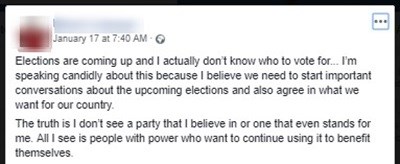
Top stories






More news

ESG & Sustainability
#AGES2026: How to back Africa's next-gen green and blue entrepreneurs















Logistics & Transport
#Budget2026: Road freight logistics and what it means for consumers


Election time is the perfect opportunity for political parties, and their leaders, to create a digital and social media strategy that resonates with their constituencies and that keeps people engaged. Most political parties in South Africa tend to shoot from the hip; to approach social media only as a campaign tool, rather than a significant part of their strategy. This year, things will need to be different to convince the hyper-connected voter.
How to change the existing approach:
Social media platforms give us the ability to research keywords, discussions and hashtags which are clues around what people feel about certain topics. One of the ongoing discussions among South Africans on social media is their uncertainty about which party to vote for, that most political formations are great on paper but fail to convince voters with their actions and interactions. Looking at some of these numerous updates, comments by friends and others echo similar sentiments.
Politicians, by the looks of it, are going on as though it’s business as usual. Campaigns seem to work off the assumption that this election will be the same as others, that manifestos and sloganeering are enough to sway the voters. Yet every other post tells us that people do not feel as though their views are being represented by a team that speaks to them. Basic conversation data is easily and freely accessible to inform a party that wants to stand for the change that individuals are calling for.
Most parties use their profiles to promote media statements and press releases, which are important but can also take away from human interaction (more about this later) and this is a hugely missed opportunity. Research conducted on social media leading up to the election of ANC president, Cyril Ramaphosa, showed that parties with vocal members on Twitter drove a more powerful narrative.
This was the case in ANC party narrative where the DA and the EFF had vocal individuals, which led to these opposition parties being nearly as visible as the ANC. This meant that, when people looked at ANC party election mentions, the DA and EFF would show up nearly as many times as the ANC. Opposition parties, in this case, had more influential party leaders speaking up against the ANC process, and adding to the narrative.
While there may have been numerous contributing factors that caused this, one stand-out reason is that individuals are typically more trusted than brands or political parties. They are also able to disengage from a script and can interact more meaningfully with their followers.
Political parties tend to have a “safer” (read as boring) scripted approach in their response to user comments, which they feel might serve the party well, but in reality, it builds more walls between the party and its constituent base. Having individual voices and responses resonates more with people than media statements and strict, scripted party lines, and the resulting content feels more honest, authentic and transparent.
Critics have pointed out that politicians and their various formations utilise social media to drive propaganda and party messaging. With over 2,7-billion people across social media, building an engaged audience is worth the time and investment – beyond just pushing messages.
Political parties can see a lot of benefit from regular interactions with their followers, which can range from live videos on Instagram or Facebook, and ongoing Twitter question-and-answer sessions. Fake news has become part of our daily lives, so much that some people cannot tell the difference between honest reports and misinformation.
As we head to May, when it’s estimated that South African national elections are likely to take place, open public interactions may be helpful for parties as a way of dispelling misinformation.
Hosting these sessions every fortnight at first, then weekly as we close in on the elections, will contribute towards building and maintaining an approachable organisation. The ones who are authentic and honest may win voters over with their openness, which millennials appreciate among their chosen leaders.

Since joining Twitter in November 2018, former president, Jacob Zuma has posted many videos as interactions with South Africa and the world. The account has been one of the fastest growing ones in South Africa and has had its fair share of media mentions. This has, in some ways, increased brought the former president back to the nation’s consciousness without the need to seek media in traditional ways.
According to the SA Social Media Landscape by Ornico and World Wide Worx, South Africa has over 8-million Twitter users. Video is also the fastest growing form of rich media content on across the social web with platforms like IGTV solely dedicated to this form of media.
Unlike traditional media video, social media requires shorter, punchy content that makes its point quickly and succinctly. These can form part of ongoing messaging that addresses burning issues that come up in ongoing interactions from the previous point. It can also be used to breakdown the often wordy and complex elections manifestos that hardly resonate with the public.
Since the days of former president, Barack Obama’s wildly successful campaign that many politicians and world leaders try to copy, social media makes political leaders accessible. And to win people over, politicians should come out from behind party manifestos, rehearsed speeches and spin.
Social media, from Instagram to LinkedIn offers users the opportunity to connect at a human and approachable level, which is what’s missing – in some ways – in South African politics. This is arguably the case in politics across the world, because even some of the most active leaders are not responsive.
Every community has its influencers, individuals who sway the conversations one way or another, and individuals whose mentions generate more chatter than average. As a party that’s paying attention to both data and people, you’ll begin to notice who these individuals are in your community.
Some of these engaged individuals will be micro-influencers, people with a relatively niche following who are not big-name celebrities. Once they have emerged from the noise and clutter, whether they are card-carrying members or not, find a way to reward them. This may be an invitation to a closed event where they get to ask questions or another useful form of interaction.

One of the great things about social media is its immediacy, the ability to disseminate a message in real-time to people across the world. It’s also arguably its curse because our timelines are so filled with messaging from everywhere that important communication drowns in a sea of ever-increasing noise.
How can organisations address this? Build a platform that can consolidate these interactions into a single, owned platform that anyone, including the media followers, can get access to. Your digital team can then curate conversations, Tweets, Instagram images and video content that can be displayed on the site.
A single platform for all social media interactions, such as a microsite, will ensure that you separate yourself from the noise and make content more visible. Some of this content can be referred back to for articles and other content.
The 2019 elections will be interesting with more political formations coming to the fore over the past few months, three of which are led by people with known public profiles. Parties need to stand out and prove to uncertain voters that they deserve a chance, which will largely be the product of creative and transparent communication with South Africans. Social media and digital platforms may prove to be the most effective way to reach out.
